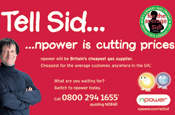Ads that attack rivals are becoming more popular with UK corporate brands, too. Last week, Virgin Atlantic revealed it will roll out a £3m campaign telling consumers why the planned alliance between British Airways (BA) and American Airlines (AA) is a bad idea. In 2001 it carried out a print and poster campaign arguing against an earlier BA/AA tie-up proposal.
'It is a very effective way of differentiating our brand,' says Virgin Atlantic's director of communications, Paul Charles. 'We are known as a challenger brand, snapping at the heels of our rivals, he says. It is important that the dominant brand is kept on watch.'
Rory Sutherland, executive creative director and vice-chairman of Ogilvy, agrees that challenger brands have a responsibility to be aggressive in their marketing. 'Brand leaders can't knock brand followers - I don't think it really works when BA attacks easyJet. Outright challenger brands often should knock dominant brands, though, as their raison d'etre is often disdain for, and separateness from, the category establishment,' he says.
The most obvious example of this is price-comparison ads, as used by supermarkets, but confrontational advertising is now accepted in sectors with a more homogenous product offering, such as energy providers and airlines. Npower has revelled in its role as a challenger brand to British Gas, and has taken every opportunity to pick apart its competitor's products and prices.
Npower's marketing director, Kevin Peake, says he wants consumers to feel 'respected and looked after'. Npower also borrowed British Gas' 80s 'If you see Sid, tell him' slogan for a recent campaign, depicting Sid as a British Gas customer stuck in the past, with the line 'Tell Sid Npower is cutting prices'.
Peake says confrontational ads serve an additional purpose by helping consumers understand what is available to them. 'A utility purchase is not necessarily the most interesting thing in the world, so ads can play a role in helping consumers make a choice.'
Last year, when Virgin Media entered the phone, broadband and TV market, it became embroiled in a marketing war with dominant player Sky after the latter chose to withdraw its core channels from the Virgin platform.
Nielsen estimates that the two brands spent a combined £92m on advertising over a five-month period. Ashley Stockwell, managing director of change at Virgin Media, says the brand has 'never been afraid to stand up for what it believes in and what is right for its customers'.
However, it was Virgin Media that limped out of that battle in November 2007, when its managing director of marketing, James Kydd, remarked: 'There is no point spending any more time or money whacking the crap out of each other.' Earlier in the year, Kydd, who will depart Virgin in a few weeks, had suggested that it could become confusing for the consumer if the sole point of a brand's ad was to 'kick the sh*t out of the competition'.
Sky, meanwhile, has continued to name its competitors in marketing activity. However, the brand came unstuck in May this year when the ASA censured it for national press advertising that accused and Virgin Media of 'funny business'.
Rob Lynam, account director at media planning and buying agency Mediaedge:cia, believes that brands can positively
engage consumers with ads criticising their competitors, but says the strategy should be used sparingly. 'When it becomes a sustained tit-for-tat between brands, the message can be lost,' he adds. 'You get to a stage where people don't know what to believe.'
In the same way that negative political campaigning tactics are claimed to have had a hand in driving down the election turnout in the UK, there remains a danger that brands can damage their own sectors by launching attacks on close rivals.


